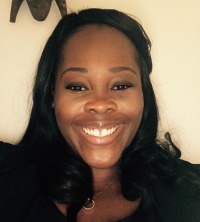Alumni Research Spotlight: Effect of Collaborative Learning on African-American Doctoral Students
Zsa-Zsa Booker is a 2012 graduate of the MLIS program. She has a PhD, also from Wayne State, in Education, Evaluation, and Research. Dr. Booker now works for the university as a Learning Skills Specialist for the Office of Learning and Teaching in the School of Medicine.
 Dr. Booker and her colleagues recently presented a paper at the Hawaii International Conference on Education. We asked her to share more details about her research and her advice to students and alumni interested in presenting at a conference.
Dr. Booker and her colleagues recently presented a paper at the Hawaii International Conference on Education. We asked her to share more details about her research and her advice to students and alumni interested in presenting at a conference.
Your paper and presentation focused on the effect of collaborative learning on African-American doctoral students. Can you tell our readers more about your research and findings?
The Finish Line Doctoral Student Group Learning Community is a group of African American doctoral students who came together in the fall of 1998 in order to establish a community and support for each other. The group started with 5 people and has now grown to more than 100 members, with more than 35 graduates who has earned their degrees. The group grew by word of mouth and continues to grow each year.
The purpose of this paper, presented at the Hawaii International Conference on Education, was to do the following: consider the sociological, organizational, and psychological frameworks for collaborative learning; examine supportive practices that promote achievement and degree completion for Black doctoral students; motivate session attendees to reflect on the hidden curriculum and the obstacles it places in front of degree completion; encourage session participants to form their own collaborative learning groups and mentoring networks.
According to the literature, from 2012-2013 academic year 175,038 doctoral degrees were conferred in the United States, and of this number 12,084 or 6.9% of those degrees were conferred to African American students, with 110,775 or 63.3% of those degrees conferred to White students (USDE, 2016). These figures are an illustration of the large disparity in doctoral degree attainment between African American and White students. The original 5 members saw that they were the only African Americans in their classrooms (student or instructor), witnessed a hidden curriculum, and experience some isolation. The learning community was established based on a need at a Midwestern higher education institution, a need for more support for these students of color. Although, most of the literature on Learning Communities focus on undergraduate communities, the fact still remains that there has been evidence that they have a positive impact on student retention.
The Finish Line group was implemented as a support group and turned into to so much more. Some of the accomplishments of the group include weekly study groups, mentoring, professional development, and academic planning to name a few of the ways the group helps to support each other. This is a huge part of why this group has been so successful, the group has found a way to fully integrate academic and social activities. Sociological, organizational, and psychological theories provide a foundation for learning communities. Sociological theories include Tinto's Theory of Student Departure, Student Integration Model, and Interactionalist Theory (Ackerman & Schibrowsky, 2008; Braxton, Hirschy, & McClendon, 2004; Kuh & Love, 2000; Tinto, 1988, 1993). The Theory of Student Departure consists of three stages - separation, transition, and integration. Likewise, the Student Integration Model and Interactionalist Theory consist of academic integration and social integration constructs. The common component for all three theories is integration e.g. students who fully integrate academically and socially with the institutional culture will persist to degree completion. The group continues to thrive and more graduates continue to come from this learning community each year.
How can students and alumni can apply your research to their school or work lives?
This information is applicable in many ways, but it mostly provides students with a framework of how to create a support system, when it does not already exist in your institution or community. This group started with 5 people, who saw challenges in their academic setting and they found a way to change it. Students are and have to be their own best advocates for their education.
What are the benefits of attending a large, international-level conference? Do you have any advice for students and alumni who may be considering participation in an international conference?
The Hawaii International Conference was a great way to network and learn from educators from all over the globe. I would highly recommend that students attend at least one professional conference each year. I was able to gain more theoretical and practical knowledge, but most importantly I was able to come back more motivated to do better! My advice would be to plan ahead and decide on your sessions before attendance, this makes it easier to focus on learning, networking, and having a good time!